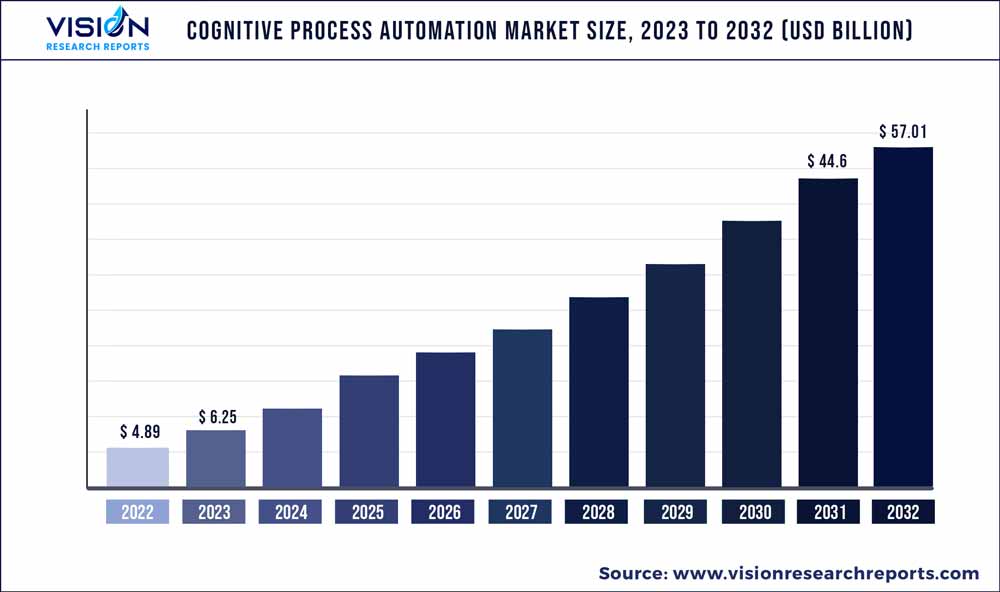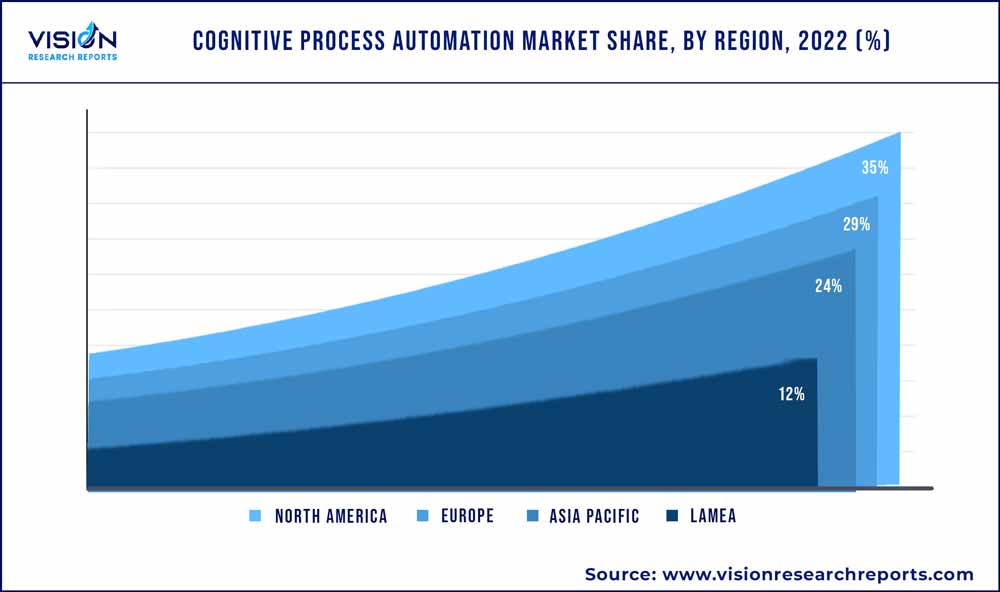The global cognitive process automation market size was estimated at around USD 4.89 billion in 2022 and it is projected to hit around USD 57.01 billion by 2032, growing at a CAGR of 27.84% from 2023 to 2032. The cognitive process automation market in the United States was accounted for USD 1196 million in 2022.

Key Pointers
Report Scope of the Cognitive Process Automation Market
| Report Coverage | Details |
| Revenue Share of North America in 2022 | 35% |
| CAGR of Asia Pacific from 2023 to 2032 | 30.95% |
| Revenue Forecast by 2032 | USD 57.01 billion |
| Growth Rate from 2023 to 2032 | CAGR of 27.84% |
| Base Year | 2022 |
| Forecast Period | 2023 to 2032 |
| Market Analysis (Terms Used) | Value (US$ Million/Billion) or (Volume/Units) |
| Companies Covered | Automation Anywhere Inc.; Blue Prism; Edge Verve Systems Ltd.; International Business Machines Corporation; Microsoft Corporation; NICE; NTT Advanced Technology Corp.; Pegasystems; UiPath; WorkFusion, Inc |
Cognitive process automation is gaining prominence in organizations because it can complete tasks faster and with fewer errors by automating processes like document analysis, data entry, decision-making, and customer support. Cognitive process automation automates cognitive tasks that humans performed traditionally, leading to increased efficiency and productivity. Moreover, it can help optimize resource allocation and reduce the need for additional workforce in certain areas, propelling market growth.
Cognitive Process Automation (CPA) is advancing through the continuous development and integration of various technologies. Cognitive Process Automation (CPA) and the Internet of Things (IoT) can be used to create powerful and intelligent automation solutions. Integration of IoT data with CPA systems can provide real-time insights and enable sensor-based automation. For example, smart home automation or predictive maintenance in industrial settings. For instance, IBM, a U.S.-based technology company, combines IoT and CPA in various industries. IBM integrates IoT sensors with its Watson IoT platform and employs CPA techniques for predictive maintenance in manufacturing facilities.
Businesses leverage CPA to automate customer service interactions through virtual assistants, chatbots, and voice recognition systems. Customer service solutions powered by CPA can handle common inquiries, provide real-time support, and help customers with self-service options, improving response times and customer satisfaction. CPA is revolutionizing financial operations and accounting by automating invoice processing, expense management, account reconciliation, and financial reporting tasks. By streamlining these processes, businesses can reduce errors, improve accuracy, and increase financial efficiency. Moreover, CPA can optimize supply chain operations by automating demand forecasting, inventory management, supplier management, and logistics processes.
Type Insights
The robotic process automation segment dominated the market with a revenue share of 64% in 2022. Various factors including the growing need to optimize operations for increased productivity and maximum return, integrating advanced technologies, and changing business processes across enterprises are expected to drive segment growth. Robotic process automation (RPA) is particularly effective in automating repetitive, manual tasks, such as data entry, form filling, validation, extraction, and basic calculations. RPA bots mimic human interactions with user interfaces, enabling them to complete tasks more quickly and accurately. Moreover, organizations can automate more complex decision-making processes, data analysis, and handling of unstructured data by combining RPA with cognitive capabilities.
The intelligent process automation segment is expected to grow with the fastest CAGR of 29.63% from 2023 to 2032. The intelligent process automation segment is expected to grow as it empowers organizations to transform their operations and unlock new levels of productivity and innovation by combining cognitive capabilities, machine learning, and robotic automation. Intelligent process automation (IPA) allows businesses to automate routine tasks and complex decision-making processes, increasing efficiency, accuracy, and scalability. IPA enables end-to-end process automation by integrating various tasks and systems. It enables organizations to automate complex workflows involving multiple steps, systems, and stakeholders.
Services Insights
The finance segment dominated the market with a revenue share of 40% in 2022. Customer requests like loan approvals, account openings, and credit assessments can be processed more quickly and accurately with the help of cognitive process automation. Automation improves the overall customer experience by reducing processing times and increasing data accuracy, which raises customer satisfaction levels. The growing use of cognitive process automation to detect and prevent fraud in financial transactions propels the segment's growth. Moreover, machine learning algorithms can identify patterns, anomalies, and suspicious activities, helping organizations detect and mitigate fraud risks.
HR segment is expected to grow with the fastest CAGR of 30.25% from 2023 to 2032. Cognitive process automation can produce insightful data for workforce planning, talent management, and employee retention by analyzing vast amounts of HR data, including employee demographics, performance metrics, and engagement levels. Moreover, it enables chatbots and self-service portals that give employees immediate access to HR data and services. Human resource management services are being transformed by cognitive process automation, which enables HR professionals to concentrate on strategic initiatives, enhance employee experiences, and promote data-informed decision-making.
Application Insights
The machine learning segment leads the market with a revenue share of 25% in 2022. Cognitive process automation uses machine learning to process, analyze, and derive insights from structured and unstructured data, enabling businesses to scale their operations and make informed decisions based on data analysis. Moreover, intelligent document processing uses machine learning to automate the extraction and analysis of data from unstructured documents like financial statements, contracts, and invoices. Many businesses are using cognitive process automation for machine learning across various sectors. For instance, Amazon.com, Inc. utilizes machine learning in its e-commerce operations, including product recommendations, inventory management, demand forecasting, fraud detection, etc.
The natural language processing segment is projected to grow with the fastest CAGR of 29.24% from 2023 to 2032. Companies can automate and improve customer support procedures, lower costs, and offer a more individualized and effective customer experience by utilizing natural language processing in virtual agents. NLP enables machine translation, enabling systems to automatically translate text from one language to another. Language translation capabilities in cognitive process automation can support multilingual customer interactions, offer real-time translation services, or improve communication in international business operations.
Industry Vertical Insights
The BFSI segment dominates the market, with a revenue share of 23% in 2022. In the BFSI industry, cognitive process automation helps enhance risk management and fraud detection. Massive amounts of data can be analyzed by AI algorithms, which can spot patterns and alert users to potentially fraudulent activity. The BFSI sector offers significant opportunities for increasing operational effectiveness, improving customer experiences, and mitigating risks through cognitive process automation. Moreover, banks and other financial institutions can automate and streamline customer onboarding procedures using cognitive process automation.
Healthcare & Life Sciences segment is projected to grow with the fastest CAGR of 31.03% from 2023 to 2032. Businesses in the life sciences sector can use intelligent automation to enhance operations across all functional areas, including development, manufacturing, sales & marketing, supply chain, and distribution. The businesses have already deployed intelligent automation solutions to help with DNA and RNA genomic sequencing and the detection of biomarkers in drug discovery and research. Moreover, healthcare organizations can benefit from intelligent automation's power to improve supply chain management, streamline appointment scheduling, and onboard new patients.
Regional Insights
North America dominated the market with a revenue share of 35% in 2022. The North America cognitive process automation industry has been experiencing significant growth due to the growing adoption of artificial intelligence technologies and the demand of organizations to automate cognitive tasks. In North America, intelligent virtual assistants such as customer service and sales support are frequently used for interactions. These virtual assistants use cognitive process automation to comprehend and respond to customer inquiries, carry out tasks, and enhance customer experiences.

The Asia Pacific region is expected to grow with the fastest CAGR of 30.95% from 2023 to 2032. The Asia Pacific region has experienced widespread, rapid digitization, which has increased interest in automation and AI technologies. Organizations are adopting cognitive process automation to improve productivity, cut costs, and streamline operations. As major tech hubs in the Asia Pacific region such as China, India, Japan, and South Korea actively invest in AI research, development, and supporting innovation, the market for cognitive process automation remains on the brink of expansion.
Cognitive Process Automation Market Segmentations:
By Type
By Services
By Application
By Industry Vertical
By Regional
 Cross-segment Market Size and Analysis for
Mentioned Segments
Cross-segment Market Size and Analysis for
Mentioned Segments
 Additional Company Profiles (Upto 5 With No Cost)
Additional Company Profiles (Upto 5 With No Cost)
 Additional Countries (Apart From Mentioned Countries)
Additional Countries (Apart From Mentioned Countries)
 Country/Region-specific Report
Country/Region-specific Report
 Go To Market Strategy
Go To Market Strategy
 Region Specific Market Dynamics
Region Specific Market Dynamics Region Level Market Share
Region Level Market Share Import Export Analysis
Import Export Analysis Production Analysis
Production Analysis Others
Others